Hahn Piesporter Michelsberg Riesling 2017
Matheus Piesporter Michelsberg Riesling is made from 100 percent Riesling.
QBA stands for "Qualitätswein bestimmter Anbaugebiete", which means that the wine comes from one of the 13 designated wine regions.
A beautiful wine with delicate perfumed aromas. Medium bodied, well balanced, filled with peaches and green apples, crisp and fresh acidity.
Matheus Piesporter Goldtropfchen Riesling Kabinett is made from 100 percent Riesling.
This Goldtröpfchen ranks as an unofficial "Grand Cru" delivering light floral and fresh Kabinett style wines.
Their later harvest wines, Spatlese and Auslese, tend toward apricot flavors, honeyed notes and superb intensity. All grapes are grown on Devonian slate.
Enjoy with slightly spiced sushi or moderately spicy Indian cuisine such as chicken Vindaloo.
Weller-Lehnert Piesporter Domherr Grosses Gewachs Riesling is made from 100 percent Riesling.
Made in accordance with the stringent production criteria of the classification of the Bernkasteler Ring, wines with the designation “Grosses Gewächs Bernkasteler Ring” represent the premium line of the association’s dry wines. These Grand Crus can only come from the best sites of the steep slopes and are distinguished by their exceptional aging potential. To be awarded the status of “Grosses Gewächs”, selective hand-harvesting, a restriction of yields to 50 hl/ha and the passing of a stringent sensory examination by a highly qualified professional panel are required.
Piesporter Domherr is the ancient and original Piesporter Goldtröpfchen. It lies in the heart of Piesporter Goldtröpfchen right by the Mosel River. It consists of 4 hectares that are south-southeast facing.
The locatio on the river creates a mirror effect, offering optimum conditions for the production of outstanding mineral wine with fine, fruity elegance. Because of its prolonged vegetation period, Riesling (frequently referred to as the “queen of white varieties”) is often capable of expressing the characteristics of its terroir like no other.
Inspired by the historical winemaking techniques of Erni Loosen’s great-grandfather, the Appassionata Riesling GG is made in the same way as the Dr. Loosen Grosses Gewächs (“Great Growth”) Rieslings he produces in Germany. The GG designation indicates a dry-style wine from a vineyard of special distinction — in this case, the old-vine Medici vineyard, planted in 1976. We farm this exceptional site, which is just a few miles east on the Chehalem Mountain ridge.
The fruit for this wine was harvested from old Rieslng vines (planted in 1976) in the Medici Vineyard, which is also in the Chehalem Mountains AVA, just a few miles from the winery. We lease this vineyard and have been farming it organically since 2015. The wine was fermented in a 3,000-liter German oak cask, and rests on the full lees for 12 months before bottling. The extended lees contact allows the wine to clarify and find its own harmonious balance naturally.
Production notes:
Whole-cluster pressing; natural fermentation in a neutral 3,000-liter oak cask; matured on the full lees for 12 months; no bâtonnage.
Review:
If you prefer a thinking person's wine you'll run out of superlatives to describe this Riesling from Dr Loosen's Oregon project with J Christopher Wines. From a personal favourite, the old vines of the Medici Vineyard, the winemaking shows serious patience and determination. Fermented in a 3,000-liter, neutral oak German Fuder cask. It rests on the full lees for two years and is then held in bottle for three to five years before release. Aged, savoury and delicious. Aromas are savoury and saline. Lanolin, dandelion, seafoam, and beeswax with hints of fresh herbs and dried lemon peel. The palate is brilliant, savoury and bright and complex. Energetic flavours of wet slate, savoury bee pollen, white tea and lanolin notes. The finish offers crushed stone vibrancy.
-Decanter 93 Points
A late harvest Riesling with fruity sweetness and great aging potential, aromatic bouquet of honey, melon, ripe fruits. Grapes come from Brauneberger Juffer and Juffer-Sonnenuhr - one of the most prestigious vineyards in the Mosel winegrowing region. The vineyard faces south and provides the best conditions for growing Riesling.
Pairs well with pâté, Asian cuisine.
Alain Jaume Domaine du Clos de Sixte Lirac is made from 50% Grenache, 35% Syrah, 15% Mourvedre
An intense red garnet color. On the nose, aromas of red and black ripe fruit (kirsch and wild blackberry). The mouth is full, with aromas of blackcurrant liqueur and spice. Tannins are both harmonious and elegant thanks to the fleshiness of the wine. Hints of licorice and vanilla on the finish, which gives the wine length and complexity.
Soil type LIRAC vineyard is facing Chateauneuf du Pape, opposite side of the Rhône river. As showed by the picture and following geologist George Truc, soils are almost similar in both side. They are marked by the violence wrought by the Rhone river. It consists of a layer of marine molasses of the Miocene period covered by alpine alluvium. The presence of a great number of rounded stones known as "galets" in the earth is evidence of the time when the Rhone, then a torrent, tore fragments of rock from the Alps and deposited them on the plain. LIRAC is one of the up-coming best area from the southern Rhône valley, as it delivers outstanding wines. Winemaking & ageing Traditional wine-making in stainless still vats. Hand sorted bunches, crushed and destemmed grapes. Fermentation temperature : 30°C. 18 days of vatting with pigeages.
Review:
"The Lirac from this estate is the 2017 Lirac Clos de Sixte. It's another deep purple-colored effort offering powerful notes of ripe black cherries, melted licorice, violets, and pepper. Full-bodied, forward, ripe, and flamboyantly styled, it's packed with fruit and texture. Drink it over the coming 4-6 years."
- Jeb Dunnuck (August16th 2019), 92 pts
"Juicy and compact still, with concentrated plum and black currant paste flavors coated with licorice and backed by a roasted alder spine. Lingering bay and menthol hints too. Drink now through 2026. 3,000 cases made, 1,800 cases imported. - JM"
- Wine Spectator (October 2021), 91 pts
"There’s no missing the huge black-fruit character of this full-bodied but well-balanced Lirac. Excellent integration of tannins, fruit and alcohol, Touches of tar, licorice and Mediterranean herbs add interest, particularly at the supple finish. From organically grown grapes. Drink or hold."
- James Suckling (February 2022), 92 pts
Hahn Piesporter Michelsberg Riesling is made from 100 percent Riesling.
This wine appears fruit forward, light bodied and easy sipping with light effervescence. It is a wonderful summer sipper or aperitif wine. It will also accompany most light seafood, poultry and veal dishes.
The wine shows very nice fruits, mineral finesse with a very well balanced finish.
The Hahn Estate
The Hahn family has been in the wine business since 1650 and moved to Kobern, the present location, in 1892 to start a small winery. Konrad Hahn took over the operation in 1991, when his father retired, and works now with his Colorado-born wife Laurel Kerns-Hahn. The winery is recognized as one of the top estates in the region. The high quality of the wines is continuously confirmed by awards and medals received in regional and national as well as international competitions.
The Hahn Vineyard
The vineyards are located in Michelsberg, which is near the town of Piesport (Mosel Valley). In this most northern part, the Mosel valley is very narrow and the vineyards very steep. The warm micro climate and the use of terraces along the south facing slopes allows the vines to grow to full ripeness despite the northern location. The use of machinery is impossible and all work including harvesting is done by hand. The grapes for this wine were grown in slate soil, which is typical for the Mosel area and provides a unique minerality. The harmonious climate, warm summers and mild winters promote a long growing season providing fine fruit with balancing acidity and low alcohol.
A warm, but by far not as hot summer as 2003, continued into a beautiful sunny autumn. This allowed a perfect ripening of the grapes in 2005 vintage. Especially the always late ripening Riesling grapes achieved exceptional quality with must-weights similar to 2003 but with higher acidity levels and mineral concentration similar to 2004.
We view the 2005 vintage as the best vintage in our estate in years even though it is following several great vintages such as 2001, 2002 and 2003. We are very excited about this great vintage
- back
Philippe Milan Bourgogne Blanc is made from 100% Chardonnay
The wine is produced from vines planted in the commune of Chassey le Camp at high elevation, which brings freshness to this Chardonnay. Ripe fruit is nicely balanced with delicate notes of oak and a hint of citrus on the finish. Full flavored and complex.
Gessinger Zeltinger Schlossberg Kabinett is 100 percent Riesling.
Zeltinger Schlossberg is the little sister of the well-known grand cru site Zeltinger Sonnenuhr. Behind the old village center of Zeltingen rises the steep slope "Zeltinger Schlossberg". On the exposed vineyards of blue Devonian slate, juicy wines full of character and minerality ripen.
The Zeltinger Schlossberg Riesling Kabinett is made from fruit picked at around 86° Oechsle and was fermented to fruity-styled levels of residual sugar (42 g/l). It has a quite restrained and smoky nose of anise, Conference pear, bergamot, rose, lime tree, dill, and eucalyptus. The wine proves superbly playful, finely juicy, and fruity on the palate. This rounder and richer side is nicely buffered off by more structure and intensity in the very long and smoky finish. The feel of residual sugar is already well integrated in the after-taste, which is already more off-dry than fully fruity as lime and grapefruit skin dominate.
Acidity 8.6 g/l
Residual sugar 42 g/l
perfect match to Asian cuisine, spicy food as well as BBQ.



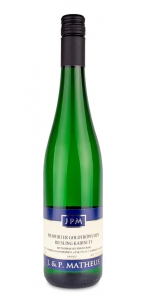
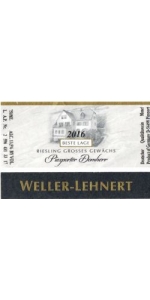
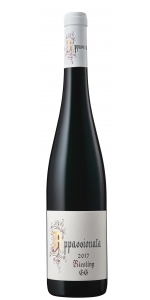
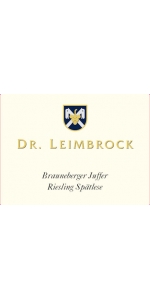
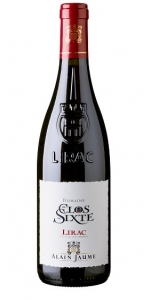
-75x150.jpg)


